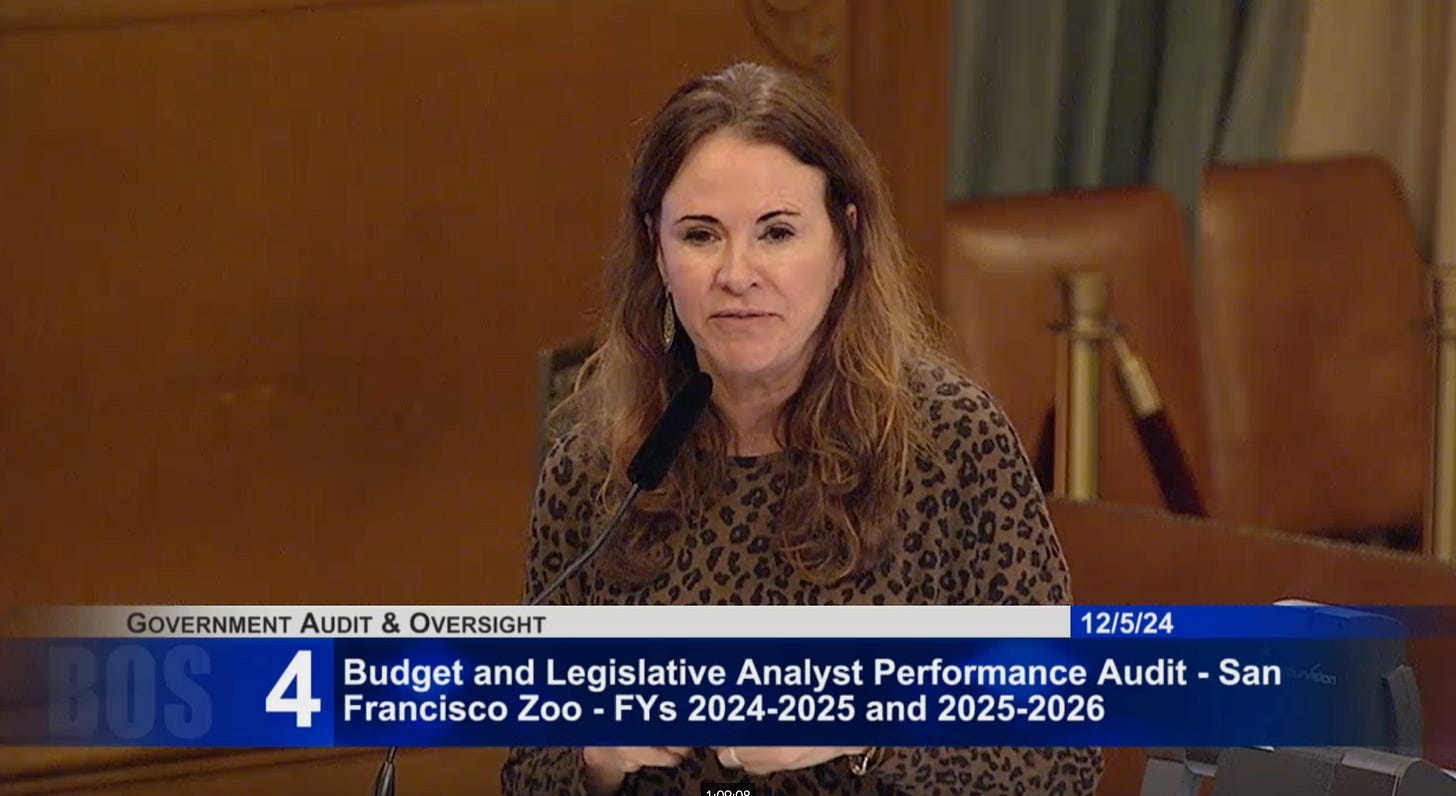San Francisco Zoo: Problems, Pandas, and Pushback
Government Audit Advances Despite SF Zoo’s Dodging and Drama

This week’s Government Audit and Oversight Committee meeting put the leadership of the San Francisco Zoo on full display—and it wasn’t a good look. Faced with a proposal for a long-overdue audit, the Zoo’s executives and allies fought hard to avoid transparency, resorting to deflection, personal attacks, and outright resistance to accountability.
Instead of welcoming scrutiny as a chance to build trust with the public and city leaders, Zoo CEO Tanya Peterson and her supporters doubled down on a narrative of victimhood, claiming the audit would harm the Zoo while lashing out at critics.
Attacking Advocates and Workers
In a truly unprofessional display, Zoo board members and allies used public comment to launch personal attacks. Melinda Dunn, chair of the zoological society singled me out as an “anti-zoo activist” who takes pride in “shutting down five zoos,” a false and inflammatory statement. What I actually do—and have consistently advocated for—is shine a light on institutions that fail to meet basic standards of animal welfare, worker safety, and public accountability.
Union representatives, who have twice voted no-confidence in Peterson’s leadership with 97% of the vote, were also targeted. One board member dismissed the union’s concerns as part of a broader “anti-zoo agenda,” rather than acknowledging the legitimate issues raised by the people who work directly with the animals.
These attacks weren’t just unprofessional—they were revealing. Instead of addressing the very real concerns about nepotism, worker safety, and governance failures, Zoo leadership chose to attack those demanding better.
Vitus Leung, the Zoo’s Deputy Director, stepped up to the mic like a used car salesman trying to close a deal: “Sure, the engine’s rattling, but don’t worry about that—just sign here for the pandas!” He earnestly warned the Supervisors that moving forward with the audit could doom the panda deal, insisting instead on renegotiating the Zoo’s lease agreement. Leung’s plea hit its dramatic peak as he invoked San Francisco’s schoolchildren and families, who, according to him, would lose an “opportunity of unimaginable cultural significance” if the audit proceeded. It was a hard sell, but the message was clear: don’t check under the hood—or under the Zoo’s operations.
Supervisors Push Back
Fortunately, the Supervisors weren’t buying it. Supervisor Connie Chan made it clear that the Zoo’s resistance to an audit was unacceptable, stating that transparency is essential for ensuring the Zoo is prepared to care for its animals and fulfill its public mission. Chan also called out the absurdity of using the potential panda transfer as leverage to stop the audit, emphasizing that accountability should come first:
Supervisor Dean Preston, while more measured in his remarks, noted that the Zoo’s reaction raised a “red flag.” He suggested their pushback might stem from a misunderstanding of what an audit entails and stressed that audits are routine and non-punitive. However, Preston’s generous interpretation only goes so far in explaining why leadership continues to fight accountability tooth and nail.
The Supervisors voted unanimously to send the audit proposal to the full Board of Supervisors, where it is expected to pass. Once approved, the Budget and Legislative Analyst’s Office will conduct a comprehensive review of the Zoo’s governance, finances, and operations—its first in 25 years.
What Are They So Afraid Of?
San Francisco Zoo leadership is scrambling to avoid an audit—and it’s easy to see why. Years of neglect, mismanagement, and misplaced priorities have left the Zoo in crisis, raising serious doubts about their commitment to animal welfare and conservation.
Animal Neglect and Crumbling Infrastructure
Outdated enclosures and century-old facilities leave animals in substandard conditions while leadership funnels millions into flashy projects like the panda plan. Staff and visitors face safety risks, but critical upgrades remain ignored.
Leadership Perks Over Priorities
As animals languish in outdated habitats, is the Zoo funding CEO Tanya Peterson’s pricey trips to Washington D.C and Antarctica on top of her $377,874 salary?
No Confidence in Leadership
Zoo staff have twice voted overwhelmingly no-confidence in Peterson, citing safety, nepotism, and governance failures—issues leadership continues to ignore.
The Truth They Fear
This audit could finally expose the truth: a leadership more focused on optics and perks than on fulfilling the Zoo’s mission. San Francisco deserves better. Let the audit begin.
A Panda Plan Full of Problems
On the same day, the Zoo announced plans to house pandas in a repurposed lion exhibit, raising even more questions about its priorities. While touted as a cost-saving measure compared to a $20 million new facility, the $8 million plan to convert the existing lion habitat has drawn sharp criticism.
Pandas, known for their sensitivity and need for specialized care, will be housed near lions—a predator-prey arrangement that could cause undue stress and compromise their welfare. Adding to the controversy, the Zoo will also pay $1 million per panda annually to the Chinese government (to improve roads, not contribute to panda conservation) on top of millions more for bamboo, care, and habitat maintenance.
Spending millions on pandas while the Zoo struggles with outdated infrastructure and worker safety concerns is a clear misstep. The plan is nothing more than a deceptive marketing scheme masquerading as a commitment to conservation.
While Supervisor Preston extended the benefit of the doubt to Zoo leadership, the rest of us should not. Their behavior—attacking critics, misrepresenting the audit, and resisting transparency—speaks volumes. This isn’t about misunderstanding; it’s about fear. Fear that the truth about the Zoo’s governance and the failure of its leadership will finally be exposed.
The public deserves better from an institution that relies on city funding, private donations, and the trust of San Francisco’s residents. It’s time for the Zoo’s leadership to stop hiding behind excuses and personal attacks and start embracing accountability.
The animals, workers, and public deserve nothing less.


